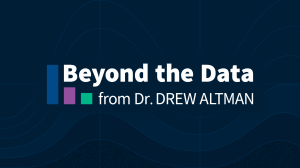Influencers May Not Have All That Much Influence in Health, Yet
Influencers are hot and thought to have growing impact on the public. Some are bringing in big paydays. But very few people say they get health information or health advice from them or trust them much. They may have a greater impact on national health policy issues, but whether it’s positive or just reinforces polarization is a question.
This comes from our ongoing tracking of people’s sources of health information and the sources they do and do not trust.
- It turns out just 14% of the public overall gets health information and advice about health regularly from social influencers. That’s just not a lot.
- By contrast, it’s higher for “news” about politics, 38%.
- And yes, it’s a little higher for some groups: 23% for 18-29 year olds, for example, and also for regular social media users compared to those who use social media less often.
Some influencers have star-level notoriety. But of those who get health information and advice from influencers, 61% see them as “mostly motivated by their own financial interests”, and many of course are. And it’s not like a lot of people have a favorite influencer they trust, such as Joe Rogan or Nurse Kate or Dr. Mike or Dr. Oz before he took his current position: 5% of social media users say they do.
However, as we used to say when I wrote about health policy for Axios, YES BUT:
- Large percentages of some groups whose members use social media – 50% of 18-29 year olds and more than a third of Democrats, independents and Republicans – get “news” about politics from influencers. People are almost certainly getting information about health policy and legislation in that mix, including recently the “One Big Beautiful Bill” and Medicaid cuts . No doubt whatever is in the national conversation finds its way into the influencer’s repertoire. It’s possible, and obviously of interest to KFF, that influencers have a greater impact on big, controversial health policy issues.
- A phenomenon we see in the polling also needs to be called out. Large numbers of people tell us they get health information from social media (particularly for weight loss, diet, nutrition, and mental health), but most say they don’t trust it. That may be because they think they are supposed to “be smart” and say they don’t trust it, but it has an impact on them anyway. It helps explain why such a large share of the public are uncertain or confused about what is true on a broad range of health and public health issues.
Asking people to disentangle what kinds of information they gleaned from an influencer is like asking them what drops of water hit them where and when from a hose. But many years ago we conducted an experiment integrating health related facts and messages into the content of the then-popular TV show ER. The challenge was similar in that experiment, disentangling the health information from the rest of the show. Perhaps surprisingly, our before and after surveys showed that many people took in the health information and it had an effect. It was also popular with viewers, suggesting that the media companies could do some good and make money at the same time (as popular TV medical shows do).
My guess is there is a similar phenomenon with influencers: At least some of the health information gets through and has an impact, but measuring the impact with precision is not easy. In today’s segmented media environment, the potential for information from influencers about health policy and public health issues to further polarization and confusion should be a concern.
Influencers are not a good or a bad thing, but no doubt represent a spectrum. Some have millions of followers they can reach for good purposes if they choose to, and many no doubt are trying to. Consider this example of a new effort to counter misinformation in the Black community with the involvement of influencers. But the numbers in the poll suggest we keep their role as purveyors of health information to the public in perspective and don’t hype it, at least for now.
